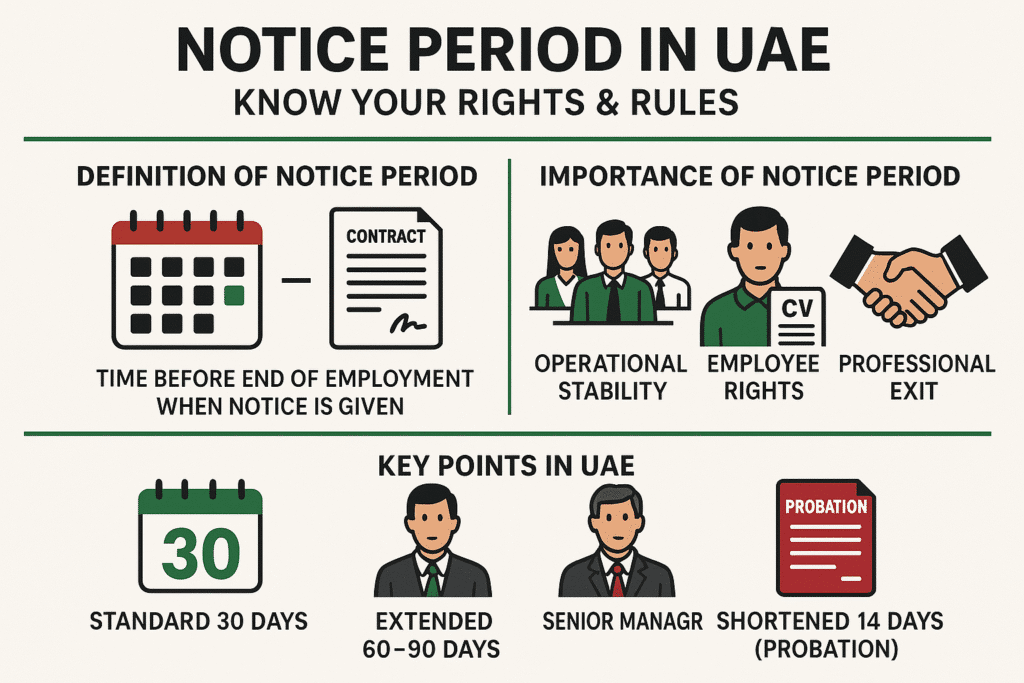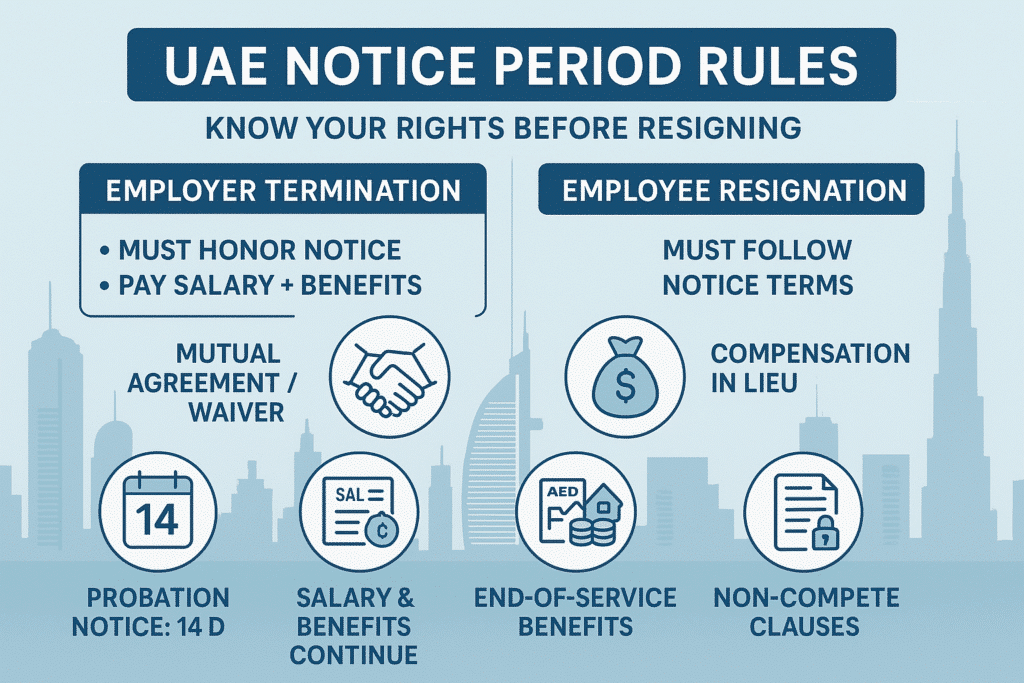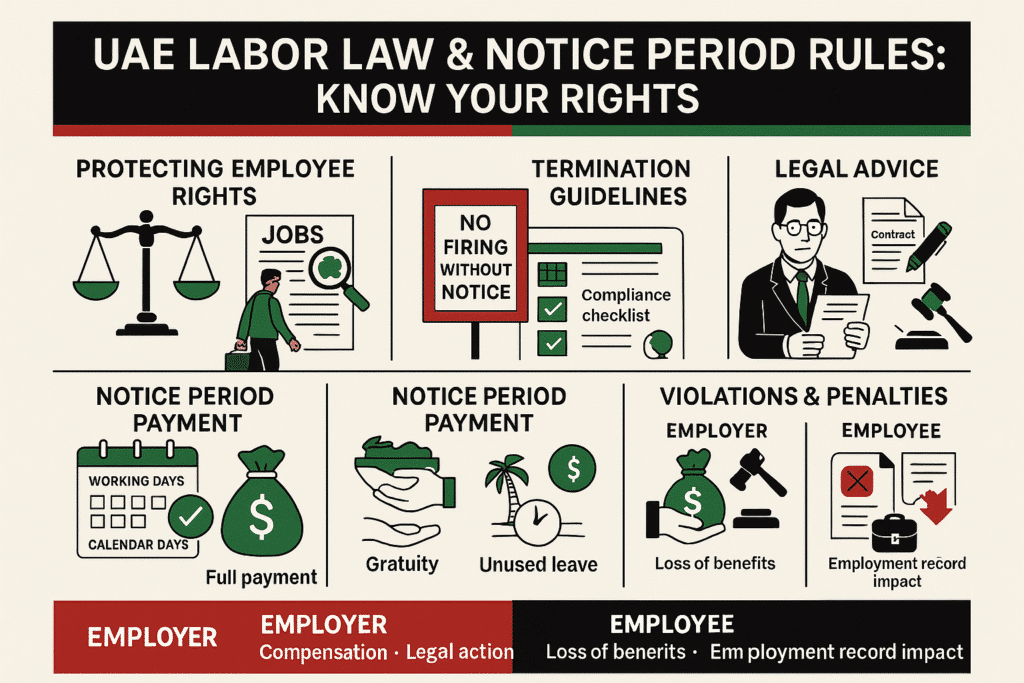
The notice period plays a vital role in the employment regime in the UAE due to its clear provisions for both employers and employees regarding employment contract termination. According to the UAE Labor Law, this period sets a proper and appropriate way of ending employment contracts to avoid surprises for all parties.
In this post, all you will ever want to know about What Is a Notice Period?
the Notice Period in the UAE
What Is a Notice Period?
The notice period is the time frame required by law or by an employment contract that allows either the employer or the employee to officially notify the other party of their intention to end the employment relationship. This makes it possible for the termination of a job not to cause a lot of problems in the organization’s planning for the exit; this way, all parties have ample time to prepare for the exit.
Importance of the Notice Period
The notice period serves several purposes:
- Ensures Operational Stability: It enables the employer to seek time to make changes and possibly look for other individuals to hire or reshuffle positions.
- Protects Employee Rights: It affords the employee a definite time of the year when they can look for other opportunities without the early pressure of the need to find another job.
- Fosters a Professional Exit: The notice period ensures that the relationship between the two parties is a courteous ending with employment.
Key Points About Notice Period in the UAE
Duration of the Notice Period
In the UAE, working from the UAE Labor Law, the standard notice period is 30 days. However, there are specific situations and contracts where this period might differ:
- 30-Day Standard: Depending on the default pattern, the period of notice is set at one month, and this is standard according to the UAE law.
- Extended Notice Periods: Maternity is not the only situation where employment contracts contain longer notice periods, which can be 60 to 90 days. This is more common in senior roles where the transition requires more time.
- Shortened Periods for Probationary Employees: The probation period will result in a short notice period that can go for 14 days for all employees under probation.

Initiating the Notice Period: Employer vs. Employee
In the UAE, both parties—employer and employee—are responsible for adhering to the specified notice period when initiating termination:
- Employer Initiation: Whenever the employer wants the termination of the employee, he or she must respect the notice period as agreed on in the contract and pay the employee full benefits, including salary for the time of the notice period.
- Employee Initiation: When an employee selects a resignation option, the notice period affects the behaviors and actions of the resigning employee.
Waiving the Notice Period
According to UAE law, termination is done through a notice period; however, both parties can agree to exclude the notice period. In such cases:
- Mutual Agreement: It has to be a mutual agreement to a certain extent, especially, having documentation so that no one will be able to bring up the issue in the future.
- Compensation instead of Notice: Sometimes, either party may offer compensation instead of serving the full notice period. This amount typically covers the salary equivalent for the notice duration not served.
Important Considerations During the Notice Period
Probationary Periods and Notice Periods
In the UAE, employment contracts, probation is a pre-employment trial period of six months or less in which the employer has the right to test an employee’s fitness for employment. During this period:
- Cut-Short Notice: Notice period tends to be shorter, and in some cases, even two weeks or 14 days.
- Flexible discharge of contract: It could also be flexible that, with shorter notice, employers are allowed to discontinue the contract where the performance of the employee is not meeting the probation requirements.
Salary and Benefits During the Notice Period
Employees in the UAE are entitled to receive their full salary, including benefits, during the notice period. This means:
- Continuation of All Benefits: This comprises accommodation allowances, transport, and any other benefits to which the employee is legally entitled.
- Clear Payment Terms: Employers must make payments within this duration, just as it is required in any other period outside the notice period in compliance with the UAE Labor Law.
End-of-Service Benefits
The employees would receive end-of-service benefits during the notice period, but only if they had served the period as the by law or the contract. Among the important points are:
- Gratuity Payments: Employees who have worked for at least one year with an employing organization would earn gratuity payments based on the final remuneration and the duration of the employment relationship.
- Additional Benefits: Employees might be paid monetary value for compensated time off, stock options, incentives, or another endowment.
Non-Compete Clauses and the Notice Period
Some employment contracts in the UAE may have non-compete provisions that forbid an employee from working for competitors during the notice period or shortly after. That’s how this impacts you:
- Enforceability: Restrictions defeat the purpose of non-compete clauses where they have to be reasonable in terms of the period, territory, and type of restraint.
- Scope of Restriction: These clauses generally apply to roles that require specific skills or sensitive information that may impact the former employer’s competitive advantage.

Additional Information about Notice Period in the UAE
Role of UAE Labor Law in Notice Period Regulations
The UAE Labor Law provides a structured framework for employment, including the rules for notice periods:
- Protecting Employee Rights: It represents the rights of employers so that the period of notice is observed, thereby allowing employees adequate time to search for new employment.
- Guidelines for Termination: There are several rights that employers are required to abide by; firing employees without appropriate notice or remuneration is one of them.
Involvement of the Ministry of Human Resources and Emiratisation (MOHRE)
It is the Ministry of Human Resources and Emiratisation (MOHRE) that puts into practice the labor laws in the UAE, among which there is legislation applicable to the period of notice:
- Monitoring Compliance: Under an ideal scenario, MOHRE makes sure that the employers follow the stipulated notice period or any other guideline touching on labor laws.
- Employee Support: If employers fail to adhere to the provisions of the notice period, employees can seek redress from MOHRE.
Legal Advice for Notice Period Queries
In case you are not sure about your rights or your employer’s obligations throughout a notice period, it is recommended to seek legal advice on UAE labor laws. They can offer guidance on:
- Contract Review: Legal professionals can review employment contracts to clarify notice period terms and any clauses affecting your rights.
- Dispute Resolution: In cases where the notice period remains in dispute, legal consultation is useful in enlightening one on the course of action and the law that would likely be taken by the bitching party.
How the Notice Period Affects the End of Employment
Notice Period Calculation and Payment
A smooth exit requires understanding how the notice period is calculated and paid. Here’s what you should know:
- Calculation Based on Working Days or Calendar Days: When it comes to the notice period, it can either be in working days or calendar days, as stated by the contract.
- Full Payment Throughout the Period: The contract also states that during the period of notice, an employee is entitled to full salary payment whether the contract is to be terminated by the employer or the employee.
Final Settlement and Outstanding Payments
During the notice period, both employer and employee should start preparing for the final settlement, which includes:
- Gratuity and End-of-Service Benefits: If applicable, these should be calculated up to the last working day.
- Payment of Unused Leave: The employers are bound by law to provide any conditional or outstanding leave as part of the termination benefits.
- Other Deductions and Additions: All other payments, including bonuses or deductions, should be well captured and explained in the final payment.
Notice Period Violations: Consequences and Penalties
Violating the terms of the notice period may result in serious consequences, particularly for the employer. Here’s what you should be aware of:
Employer Non-Compliance Penalties
Employers are expected to honor the notice period in place but if the employer fails to do so, then it attracts penalties. Key points include:
- Financial Compensation for the Employee: They may work out their rights and claim reasonable and cumulative wages for the contractual notice period.
- Legal Repercussions: MOHRE can also take severe actions against employers who fail to provide proper notice periods, especially where they are recurrent.
Employee Non-Compliance Consequences
Employees who do not adhere to their notice period may face repercussions:
- Loss of Benefits: Leaving without fulfilling the notice period may lead to a loss of end-of-service benefits or gratuity payments.
- Employment Record Impact: MOHRE may record violations, and thus employment chances in the future in the UAE may be influenced.

FAQs
What should not be done in a notice period?
Do not miss your work, cause late handovers, or defame your company. Leave professionally.
Do I need to place a 2 or 4-week notice?
Your contract – 2weeks can be done in a junior position, but 4weeks is the norm in senior ones. It may only require 14 days of probation.
What does a notice period entail?
Resignation letter, final working day, graceful exit, handover and return of company property, and salary/benefits till the last working day.
Final Words
The notice period in the UAE is not simply a mere legal provision but a guardianship in a way, for both employers and employees, for changeovers to be professional. Some aspects look relevant in employment termination, including matters related to do with salary and benefits and the contractual agreement on the termination. With regard to the specifics of your case, it is always advisable to seek professional legal advice from a practitioner in UAE labor legislation.

